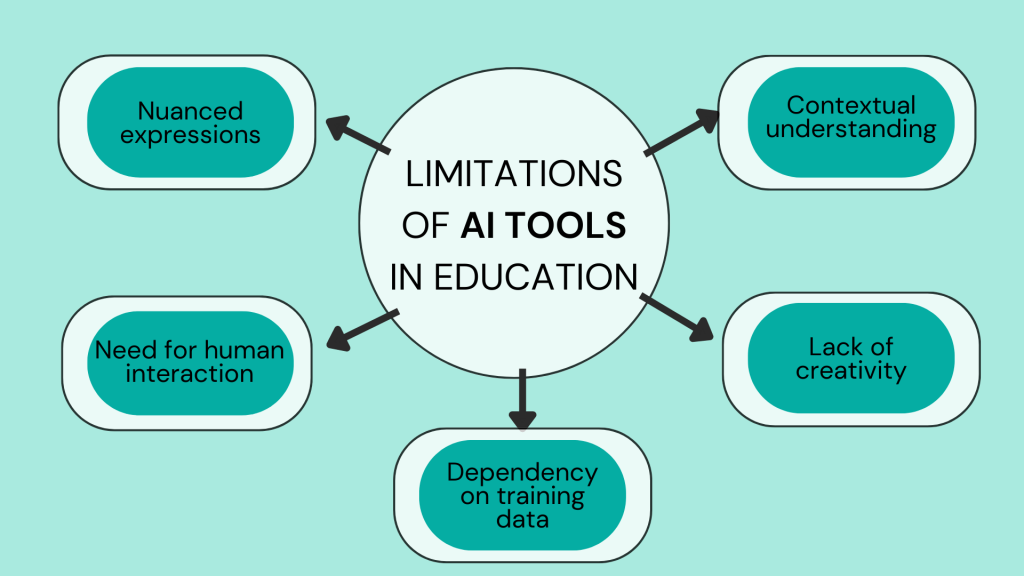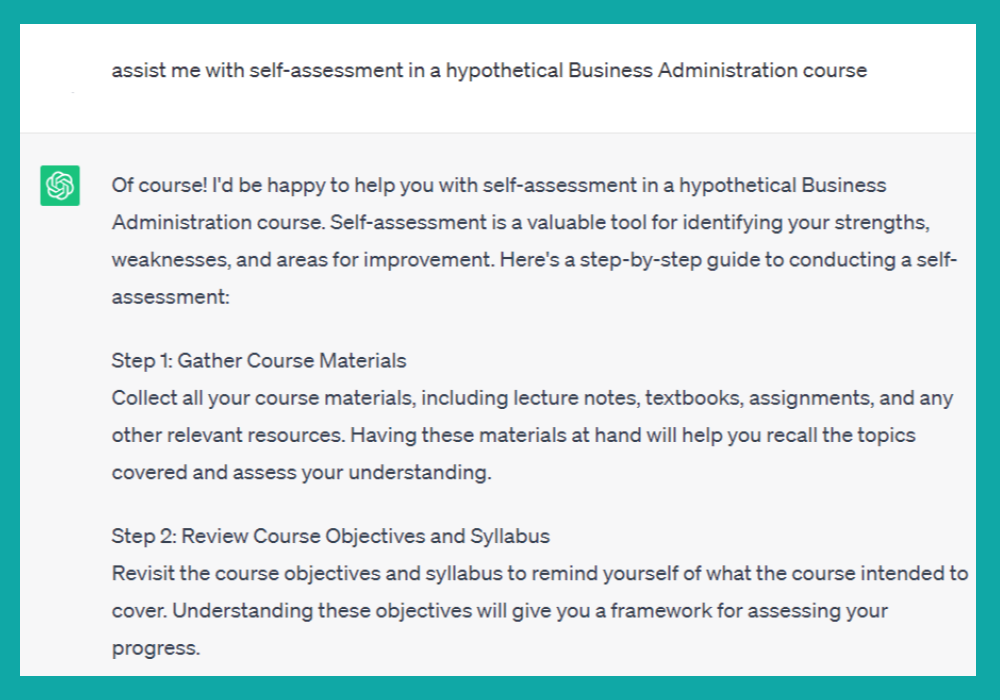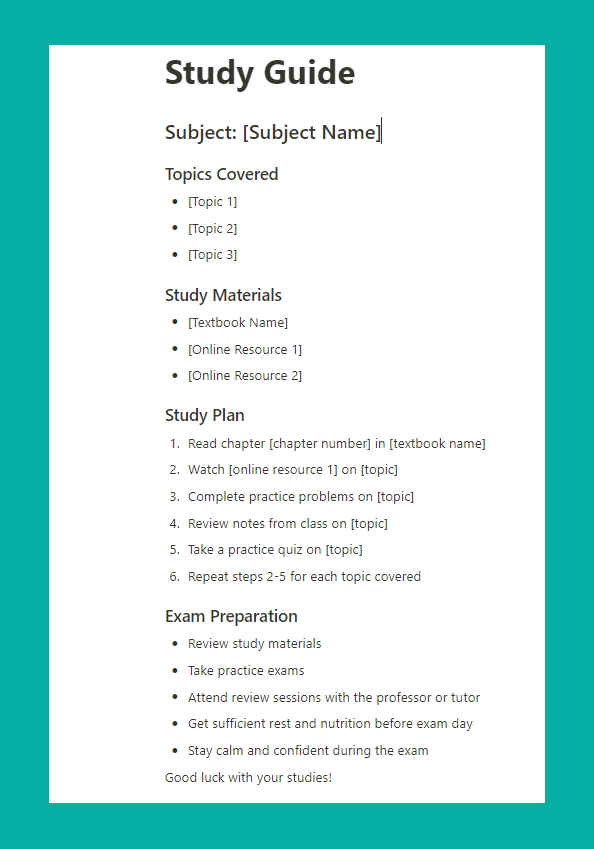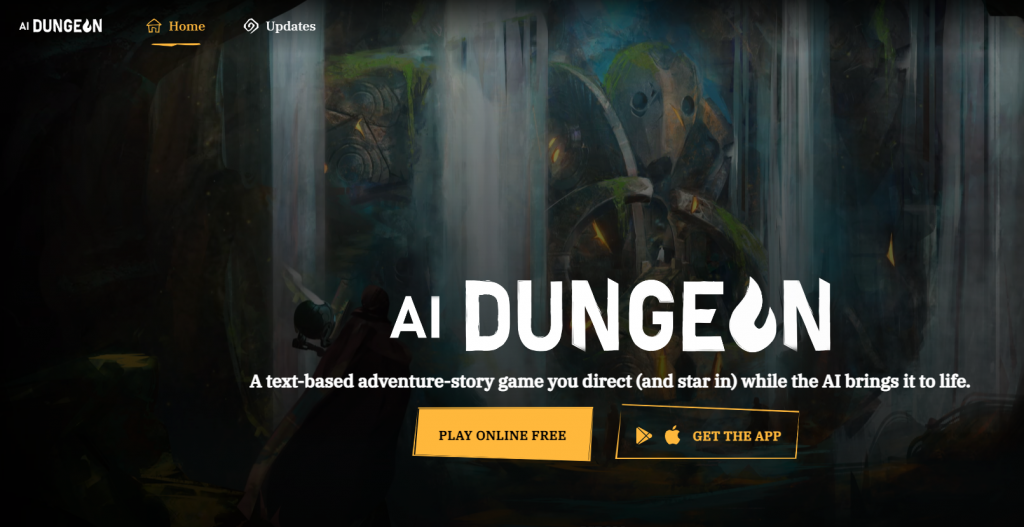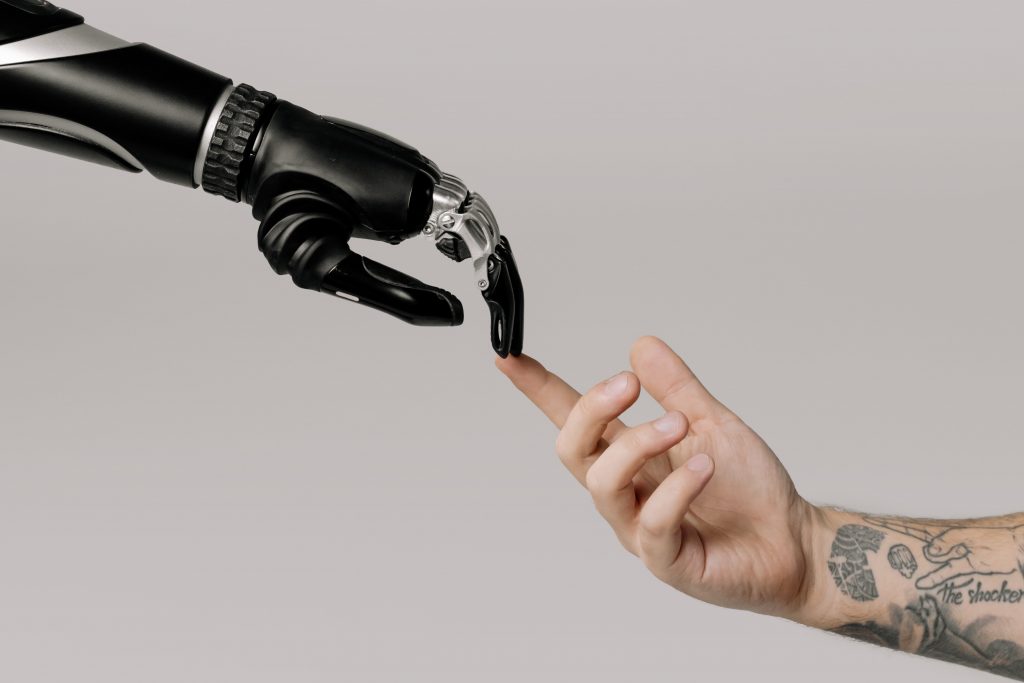As a student, I was always fascinated by the potential of Artificial Intelligence (AI) to change education. AI and education go hand in hand, empowering students with personalized learning experiences. Being a non-native English speaker studying in the United States, I have faced challenges in my academic journey, especially in understanding professors and expressing myself. But, I have found solace in the advancements of AI tools that can assist me in my studies. Throughout my educational experience, I have seen the incredible impact of AI in enhancing the learning process.
Using artificial intelligence in the classroom fosters interactive and immersive learning environments. They can analyze my progress and generate quizzes and assignments tailored to my goals and curriculum.
Additionally, they can offer valuable feedback and suggestions for improvement, empowering me to take control of my learning journey.
My journey with AI tools sparked a deep interest in exploring their advantages and limitations. While AI has made significant strides in education, it has its constraints, particularly in advanced writing tasks and nuanced expressions. It is crucial to balance the benefits of AI and the irreplaceable value of human interaction in education.
The Current Applications of AI in Education
As a student, I have seen firsthand how AI revolutionizes the learning experience. AI has found its way into various aspects of education, making it more accessible and engaging. Let’s explore some of the current applications of AI in education and the benefits they bring.
One prominent example of Artificial Intelligence in education is using AI-enabled chatbots. These intelligent bots answer students’ questions and provide real-time help. Whenever I had a query about a particular topic or needed guidance outside of regular office hours, these chatbots were there to help. They offered immediate help, ensuring I never had to wait for a response. This saved me time and enhanced my learning experience by providing quick and accurate answers.
Personalized learning platforms stand out as another great application of AI in education. These platforms leverage AI algorithms to analyze students’ progress, strengths, and weaknesses.
Based on this analysis, they offer customized learning experiences tailored to each individual’s needs. I have used such platforms, which have significantly impacted my education. By adapting the curriculum to my specific requirements, these platforms ensured that I was learning at my own pace and focusing on areas where I needed improvement. This personalized approach increased my motivation and engagement with the material.
Virtual tutors powered by AI are also making a profound impact on education. These digital tutors simulate a one-on-one learning experience, providing personalized guidance and support. The virtual tutor I have interacted with has been invaluable in my studies. It offers explanations and clarifications and even provides extra practice materials to reinforce my understanding of the subject. This individualized attention has been instrumental in helping me grasp difficult concepts and stay on track with my studies.
These AI applications in education significantly benefit by improving access to resources. With AI, educational institutions can analyze vast amounts of data and generate valuable insights. This enables them to create comprehensive databases and digital libraries accessible to students. I have found this useful, as it allows me to explore a wide range of resources and references related to my subjects of interest. Exploring the various ways to use AI in education can provide valuable insights into optimizing teaching methodologies and student engagement.
The Benefits of AI in Education
1. Personalizing learning for individual students
AI in education brings the power of personalization, allowing students to have a customized learning experience tailored to their specific needs and preferences. AI tools, such as adaptive learning platforms, intelligent tutoring systems, and chatbots, can personalize my education in the following ways:
- Individualized learning paths. AI analyzes my strengths, weaknesses, and learning patterns to create personalized learning paths. This ensures that I receive targeted instruction and focus on areas where I need improvement.
- Customized content delivery. AI algorithms can curate and recommend learning materials based on my interests, learning style, and progress. This helps me engage with the content more effectively and makes learning more enjoyable.
- Real-time feedback and support. AI tools can provide immediate feedback on my performance, helping me identify areas of improvement and offering suggestions for further study. Intelligent tutoring systems can also provide personalized guidance and support, akin to having a virtual tutor available 24/7.
2. Promoting student engagement through interactive learning
AI in education has the potential to revolutionize student engagement by creating interactive and immersive learning experiences. Here’s how AI promotes engagement.
- Gamified learning. AI-powered platforms can incorporate game elements, such as leaderboards, badges, and rewards, to make learning more interactive and competitive. This gamification aspect motivates me to take part and strive for better results.
- Virtual Reality (VR) and Augmented Reality (AR). AI can enable the integration of VR and AR technologies into educational experiences. These immersive technologies allow me to explore virtual environments, conduct virtual experiments, and visualize complex concepts, making learning more engaging and impactful.
- Natural language processing. AI-powered chatbots and virtual assistants can understand and respond to my queries. This interactive dialogue facilitates better engagement and encourages active participation in the learning process.
3. Research and case studies demonstrating a positive impact
Many research studies and case examples showcase the positive impact of AI in education. Some notable findings include:
- A study conducted by Stanford University found that students who received personalized learning through AI-powered tools performed better than their peers in traditional classroom settings.
- In a case study conducted at a high school, an AI-enabled chatbot provided instant feedback on writing assignments, leading to improved writing skills and increased student confidence.
- Research by the University of Georgia showed that AI-powered adaptive learning platforms led to higher retention rates and improved student academic performance.
Looking at real-life AI in education examples showcases its practical applications, such as AI-enabled chatbots, personalized learning platforms, and virtual tutors. Embrace the integration of AI in schools to revolutionize the learning environment.
Limitations of AI Tools in Education
While AI tools have made remarkable advancements in education, it is crucial to acknowledge their limitations, particularly in advanced writing tasks and complex grammatical structures. Here are the key challenges and shortcomings that AI tools face:
- Nuanced expressions. AI struggles to capture subtle expressions, which encompass tone, gestures, and cultural references that are inherent in human communication. The limitations in understanding these subtleties make it challenging for AI to generate content with the finesse and depth of human expression.
- Contextual understanding. Language is deeply contextual, relying on shared knowledge and cultural references. Despite their training in vast amounts of data, AI algorithms struggle to comprehend the context of a given situation fully. As a result, AI-generated suggestions can be inaccurate or inappropriate, especially when understanding context-specific meanings of words or phrases.
- Lack of creativity. AI tools cannot often think creatively and generate original ideas. While they excel at providing structured information and basic prompts, they struggle to offer truly innovative and unique insights. This limitation hampers their effectiveness in fostering critical thinking and promoting student creativity.
- Dependency on training data. AI tools heavily rely on the quality and diversity of their training data. Biased or incomplete outcomes may result from training the AI with biased or limited data. This can perpetuate existing inequalities or reinforce dominant perspectives, hindering the goal of providing a well-rounded and inclusive education.
- Need for human interaction. Despite the advancements in AI, human interaction and guidance remain essential in education. Human educators have invaluable experience, empathy, and the ability to provide personalized feedback. They play a crucial role in facilitating social and emotional development, where AI tools currently fall short.
To effectively use AI tools and ensure their integration into the educational framework, it is crucial to understand these limitations and view them as complementary to human guidance rather than complete replacements.
While AI tools have made significant progress in education, they still face limitations in advanced writing tasks, nuanced expressions, contextual understanding, creativity, and the need for human interaction. By recognizing these shortcomings, we can implement AI for education to empower educators and students by providing innovative tools, data analytics, and personalized learning experiences tailored to individual needs.
Effective AI Tools for Studying
As a student navigating through the challenges of academia, I have discovered several AI tools that have enhanced my learning experience. These tools have empowered me to assess my progress, generate ideas, and manage my time more efficiently. Recognizing the use of AI in education as a transformative force enables educational institutions to harness its potential in optimizing learning outcomes and preparing students for the future. Let me share a curated list of practical AI tools that have become invaluable companions in my educational journey.
- ChatGPT is an AI-powered chatbot that supports self-assessment and progress tracking. It generates quizzes, tests, and assignments based on my goals and curriculum, allowing me to test my understanding of the subject. The tool also grades my work and provides detailed feedback and suggestions for improvement. Here is a screenshot of how ChatGPT assists with self-assessment in a hypothetical Business Administration course:
- Notion AI is a powerful tool for organizing study materials and creating interactive study guides. It can summarize complex concepts, create flashcards, and generate study schedules tailored to my learning preferences. With Notion AI, I can effectively manage my study materials and optimize my learning process. Here is an example of a study guide created with Notion AI:
- AI Dungeon. AI Dungeon is an interactive storytelling game that uses AI to create unique narratives. It allows students to explore their imagination, practice language skills, and enhance their storytelling abilities. Here is a screenshot of AI Dungeon’s user interface:
These AI tools have proven to be invaluable assets in my academic pursuits. They have streamlined my learning process, facilitated self-assessment, and sparked my creativity. AI education is transforming our learning, making it more personalized and effective.
AI and education have immense potential for transforming the learning landscape and revolutionizing traditional educational approaches. Integrating AI in education offers vast possibilities for students like me, allowing us to personalize our learning, enhance our productivity, and foster a deeper understanding of our study subjects. So, try to learn how to use AI tools to enhance your education and improve learning outcomes.
CustomWritings.com is pleased to announce a powerful new tool for students – our free essay generator! Say goodbye to writer’s block and create top-notch essays effortlessly with this handy instrument. Try it today and see your academic writing soar to new heights!
My Journey with AI Tools
Throughout my educational journey, I have had the opportunity to explore the world of AI tools and witness firsthand how they have transformed my learning experience. One of the key aspects to consider is how to use AI in education to enhance the learning experience and improve student outcomes. As a non-native English speaker studying in the United States, language barriers have constantly challenged me. But, with the help of AI tools, I have overcome these obstacles and made significant strides in my academic pursuits.
One of the most remarkable ways AI tools have assisted me is in overcoming language barriers. As someone with English as my second language, grammar, and pronunciation have often posed difficulties. But, AI-powered tools like ChatGPT and WebChatGPT have been invaluable in providing real-time feedback on my writing and conversation skills. These tools have enabled me to practice and improve my English language skill, allowing me to communicate more effectively with professors and fellow students.
AI tools have played a vital role in improving my productivity. As a busy student, managing time has always been a challenge.
Yet, tools like Chinchilla and Notion AI have helped me streamline my study routines and enhance my organizational skills. Chinchilla’s idea-generation prompts have been instrumental in sparking creativity and refining my essay writing. But Notion AI has become my go-to tool for organizing study materials and creating interactive study guides. With these AI tools, I have maximized my learning potential and made the most of my study sessions.
While AI tools have provided many benefits, it is important to recognize their limitations. In my experience, AI tools have not yet reached the skill required for advanced writing tasks. While they can assist with grammar and basic structure, they often lack the finesse and sophistication necessary for high-quality academic work. As a result, I have learned to use AI tools for specific tasks like self-assessment, idea generation, and time management while still relying on human guidance and feedback for more complex writing assignments.
Reflecting on my journey with AI tools, I am grateful for the opportunities they have provided me in my educational pursuits. These tools have not only helped me overcome language barriers and improve productivity but have also instilled a sense of confidence in my abilities.
AI integration in the classroom enables personalized instruction, adaptive learning, and data-driven insights to support student progress.
Looking ahead, I am hopeful for AI’s future in education. We can expect even more innovative AI tools and solutions to enhance the learning experience as technology advances. By recognizing the potential of AI while appreciating the importance of human guidance, we can create a harmonious blend of technology and personal support in education.
Integrating AI into education can transform how we get knowledge, making learning more personalized, engaging, and effective. With the right balance between AI and human guidance, we can unlock the full potential of education and empower students to thrive in an ever-evolving world. So, discover the power of AI in the classroom and its impact on student engagement and academic success.

